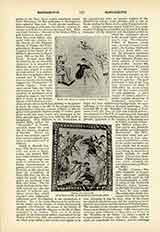

Manuel Chysoloras, first teacher of Greek in Italy, born at Constantinople about the middle of the fourteenth century; died at Constance, Germany, and was buried there, April 15, 1415. His first visit to Italy was at the time of the siege of Constantinople, when he was sent to Venice by Emperor Palaeologus to implore the aid of the Christian princes. He returned to Constantinople. In 1396 he went to Florence at the invitation of the humanists of that city, Salutato, Niccolo de Niccoli, and their friends, as professor of Greek literature. He severed his connection with the Florentine government, however, before the time for the end of the agreement had expired, owing either to intrigues which Bruno and Filelfo attributed to Niccoli, or perhaps to his own moody temperament. He was then engaged in teaching at Milan and afterwards at Pavia. In 1404 he was Manuel Palaeologus’s ambassador in Venice and visited Rome and England in the same capacity. He was also actively employed in promoting a union of the Greek with the Latin Church, and with that object in view returned once more to Constantinople. In 1413 John XXIII chose him to accompany the cardinals sent as delegates to the emperor Sigismund to fix a place for the assembling of a general council. Constance was chosen. He is mentioned in the Bull of convocation. He probably accompanied John XXIII to Constance (1414) and died there the following year. His death gave rise to commemorative essays of which Guarino of Verona made a collection in “Chrysolorina”.
Chrysoloras’s works include opuscules on the Procession of the Holy Ghost; “Epistolae tres de comparatione veteris et novae Romae”; letters to his brothers, to L. Bruni, to Guauni, to Traversari, to Pallas Strozzi. He also translated Plato’s “Republic” into Latin. Finally he is the author of the first modern Greek grammar, the “Erotemeta” printed for the first time at Florence in 1484, and immediately studied by Linacre at Oxford and by Erasmus at Cambridge. He was chiefly influential through his teaching in familiarizing men such as Bruni, Salutato, Giaoomo da Scarparia, Roberto de’ Rossi, Carlo Marsuppini, Vergerio, Decembrie, Guauni, Poggio, with the master-pieces of Greek literature. As an oral teacher he was too verbose and diffuse. As a man, however, such nobility of character and integrity was rarely met with in the Greek teachers who succeeded him in Italy.
PAUL LEJAY

